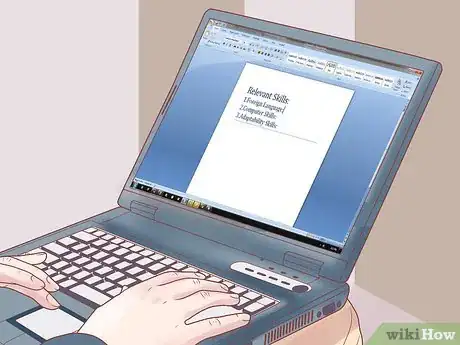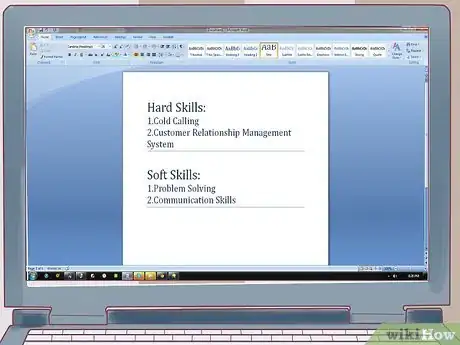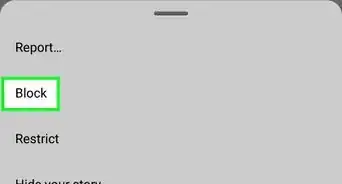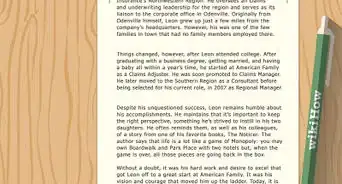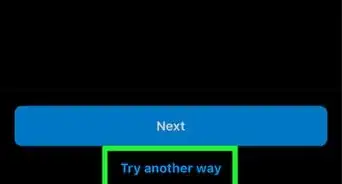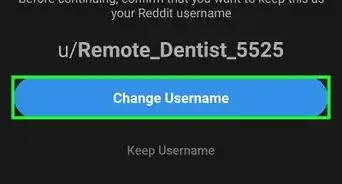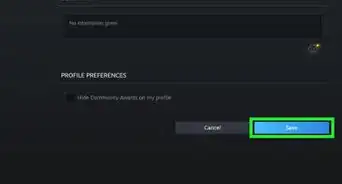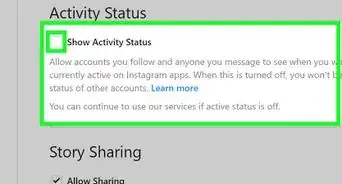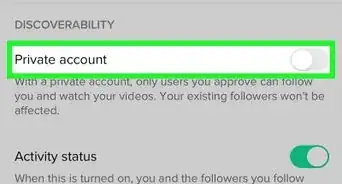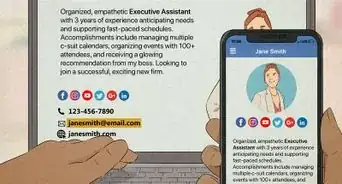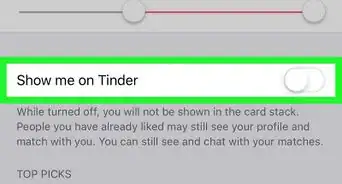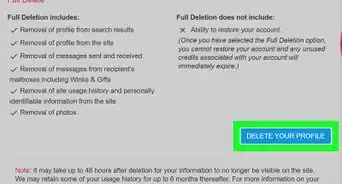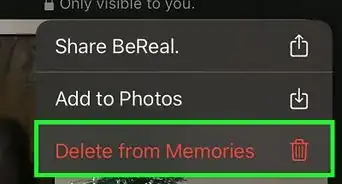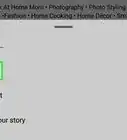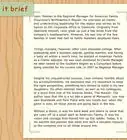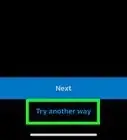This article was co-authored by Kent Lee. Kent Lee is a Career and Executive Coach and the Founder of the Perfect Resume, a career development services company based in Phoenix, Arizona. Kent specializes in creating customized resumes, LinkedIn profiles, cover letters, and thank you letters. Kent has over 15 years of career coaching and consulting experience. Previously, he has worked as a Career Consultant for Yahoo and has worked with thousands of clients including Fortune 500 executives from around the world. His work and career advice have been featured in ABC, NBC, CBS, Yahoo, Career Builder, and Monster.com.
This article has been viewed 21,375 times.
When actively looking for a job (or even when you are just keeping your options open) it is important to put your best foot forward and effectively showcase your skills in order to express your value. If you hold back your talents or hide them in a poorly organized resume, you will fail to communicate your full value and hurt your chances of getting the job. This article will help to ensure that your skills are showcased effectively, both in writing and in person. Just see Step 1 below to get started.
Steps
Showcasing Skills on a Resume or Online
-
1Use keywords and industry terms to describe your skills. Whether your resume or profiles are scanned by a software and ranked based on relevancy or they are being quickly scanned by human eyes, they must contain industry and job specific keywords.[1]
- The more keywords you have throughout, the more qualified for the job you will appear. Do not leave room for assumption! If you have a specific skill that is needed to do the job, make sure to include it.
- You can determine which exact keywords to include by reading through several job descriptions for the type of position you are seeking, posted by the types of companies you would like to work for.
- For example, if you are looking for a new sales representative position and you see the words “lead generation” and “closer” frequently, it is best to use these keywords to describe your skills in seeking new customers (lead generation) and making a sale (a closer).
-
2Add a relevant skills list. In addition to explaining your skills throughout your resume and social media profiles, it is important to highlight the skills that are most relevant to a given position, in list form. As mentioned, it is best to read through the job description of the type of position you are seeking and determine the most relevant skills required to do the job successfully. Then, list these skills in your resume or profile (provided they are true).[2]
- Skills listed in your resume: Add this list of skills and keywords towards the beginning of your resume, before your "experience" section. Skills listed should be one or two words in bullet format such as “Closer” and “Problem Solver”.
- Skills listed in your social media profile: Many profiles already have a section for you to list your skills. Some even have a drop down menu for you to utilize. As with listing these skills on your resume, use relevant keywords that you have determined from the job description.
Advertisement -
3Know the difference between hard and soft skills. Be sure to add both hard and soft skills to your resume and profiles.
- Hard skills are the teachable skills you have to do the job successfully, such as cold calling or using the customer relationship management system.[3]
- Soft skills are those that cannot necessarily be taught and are defined by a person’s natural abilities or personal traits, such as problem solving and communication skills.
-
4Remove unnecessary information. Sometimes it is important to know what not to say in your resume and social media profiles. Keeping unnecessary information in your resume and social media profiles will cause them to look cluttered and may lead the reader to skip around and possibly miss important information.[4]
- In order to make the most relevant information stand out, you must trim the fat! As a general rule, if any information does not seem important enough to get the job or to do the job successfully, leave it out!
- For example, imagine you are applying to a job that requires you to analyze financial data. If you talk about your abilities to market products and gain new customers (which is irrelevant to the job) this information will be passed over. In skipping over this irrelevant information, your experience in financial analysis may be passed over too.
-
5Make your resume and profiles easy to read. Remember, once you actually get your information in front of a real person, you want to keep their attention till the end. Therefore, the easier your resume or profiles are to read, the more likely the reader will read them all the way through.
- To do this, write in short concise sentences. This is the most effective way to convey important information and help keywords and accomplishments stand out. Lengthy paragraphs or wordy sentences will cause the reader to skin the information, potentially missing out on important details.
- For example, instead of writing, “made at least 50 cold call per day but aimed to make 60 cold calls per day“, write "initiated 50-60 cold calls per day”.
Expressing Your Skills In-Person
-
1Speak confidently about your skills and abilities. In order for someone to believe that you truly hold these skills and abilities, it is important for you to act confident. If you believe in your abilities, others will believe in them too!
- Being confident is not just about the ability to list off all of your skills, it's about expressing them in a way that is believable. Be enthusiastic and use a positive tone of voice.
- Confidence can also be expressed by engaging in eye contact, wearing a smile and having good posture (standing or sitting up straight).
-
2Provide examples to prove your skills. When you want to showcase your skills it is not enough to just tell the person that you have a particular skill. You must provide an example that proves your claim.[5]
- For example, you easily tell someone that you have good negotiation skills, but how does your interviewer know that you really have the level of negotiation skills they are looking for? Providing an example will help you to showcase your negotiation skills in a way they can remember.
- For example, try to recall one of your negotiations that created top results. Something like “I was able to successfully negotiate a $1.2million deal with a new customer”.
-
3Have a portfolio available to view in an interview. If the work you produce is of a visual nature, such as an advertiser or graphic designer, it is important to have a portfolio available for others to view. You can create a portfolio using either a good old fashioned binder, a web page, a CD or an e-folio. Whichever method you choose, be sure to include the following (as long as it is relevant to being successful in that particular job):
- Work samples (should be the largest section of your portfolio)
- Diplomas
- Certificates
- Press releases
- Reviews
- Letters of recommendation
-
4Demonstrate your relevant soft skills during meetings. When speaking with someone face to face, over the phone or via the internet, it is important to demonstrate the soft skills you claim to possess. Again, it is not enough to say you have these skills - you have to show them you do.
- For example, if you claim to have great communication skills, every interaction you have with people should illustrate this skill. Speaking clearly, holding engaging conversations and writing effective sentences leaves little room for interpretation, allowing you to effectively express your claim of having great communication skills.
- In doing this, you can ensure that you are putting your best foot forward and demonstrating your claims in a concrete manner.
Expert Q&A
-
QuestionWhat are the most important skills to include on a resume?
 Kent LeeKent Lee is a Career and Executive Coach and the Founder of the Perfect Resume, a career development services company based in Phoenix, Arizona. Kent specializes in creating customized resumes, LinkedIn profiles, cover letters, and thank you letters. Kent has over 15 years of career coaching and consulting experience. Previously, he has worked as a Career Consultant for Yahoo and has worked with thousands of clients including Fortune 500 executives from around the world. His work and career advice have been featured in ABC, NBC, CBS, Yahoo, Career Builder, and Monster.com.
Kent LeeKent Lee is a Career and Executive Coach and the Founder of the Perfect Resume, a career development services company based in Phoenix, Arizona. Kent specializes in creating customized resumes, LinkedIn profiles, cover letters, and thank you letters. Kent has over 15 years of career coaching and consulting experience. Previously, he has worked as a Career Consultant for Yahoo and has worked with thousands of clients including Fortune 500 executives from around the world. His work and career advice have been featured in ABC, NBC, CBS, Yahoo, Career Builder, and Monster.com.
Career & Executive Coach My number one piece of advice for anyone looking for a job is to use a low volume, highly customized approach. Before you submit your resume, you should look at the requirement for the job and ask yourself this question: does my resume clearly and concisely communicate how my skills meet the top three requirements for this position? If the answer is yes, submit it. If your resume does not clearly articulate how you meet the top three requirements for the job, then spend 15 to 20 minutes tailoring and tweaking it so that it does.
My number one piece of advice for anyone looking for a job is to use a low volume, highly customized approach. Before you submit your resume, you should look at the requirement for the job and ask yourself this question: does my resume clearly and concisely communicate how my skills meet the top three requirements for this position? If the answer is yes, submit it. If your resume does not clearly articulate how you meet the top three requirements for the job, then spend 15 to 20 minutes tailoring and tweaking it so that it does.
References
- ↑ Kent Lee. Career & Executive Coach. Expert Interview. 2 April 2020.
- ↑ Kent Lee. Career & Executive Coach. Expert Interview. 2 April 2020.
- ↑ Kent Lee. Career & Executive Coach. Expert Interview. 2 April 2020.
- ↑ Kent Lee. Career & Executive Coach. Expert Interview. 2 April 2020.
- ↑ Kent Lee. Career & Executive Coach. Expert Interview. 2 April 2020.
- http://career-advice.monster.com/resumes-cover-letters/resume-writing-tips/resume-skills-section/article.aspx
- http://money.usnews.com/money/blogs/outside-voices-careers/2013/03/20/5-soft-skills-to-showcase-in-an-interview
- http://www.forbes.com/sites/jacquelynsmith/2013/04/03/how-to-showcase-your-personal-brand-in-a-job-interview/


